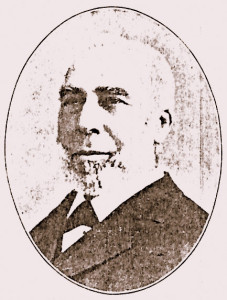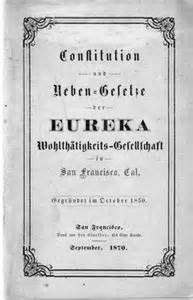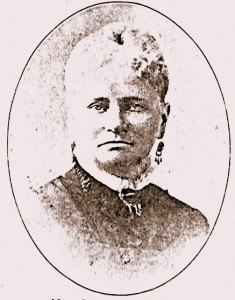Henry Greenberg
Value Codes I – E – L – P
Henry Greenberg was born in Huttenbach, Bavaria, in 1819.
His early education was in his home town.
As a young lad, he came alone to the United States, landing in New York City.
Along the way
For a while, Henry Greenberg was a peddler in the Southern United States.
In 1854, he headed West by way of the Isthmus, landing in California and first settling in Placerville in the Gold Country.
Henry Greenberg opened his first place of business in what was known as the Round Tent Store.
San Francisco
Later, in partnership with Jonas Adler, Greenberg engaged in the wholesale clothing business in San Francisco.
He eventually tired of the long hours at his store and undertook buying and selling real estate instead.
He was also a partner in the banking firm of Greenberg, Erlenbach & Goldsmith, with their bank and assay office on Sacramento and Leidesdorff Streets.
Henry Greenberg was an original director of the Pioneer and Mission Woolen Mills.
Community
Henry Greenberg was an early member of Congregation Emanu-El of San Francisco and served as a trustee.
He later resigned and joined the Ohabai Shalome Congregation, where he was soon elected president.
As supporters of the Hebrew Orphans’ Asylum, Greenberg and his wife had a tradition of inviting all the orphans to their home for festivities, including their wedding anniversary.
Henry Greenberg was also a director of the Eureka Benevolent Society.
Family
Henry Greenberg married Marie Bergtheil of New York in 1850.
Together, they had five children: Samuel, Abraham, Max, Mrs. William Kaiser, and Mrs. Emma Hilp.
Henry Greenberg died in 1883.
“He was generous to a degree and an idealist. Among his fellow men he was honored because of his fine character, his keen mind, and was loved because of his boyish heart. In all the virtues – charitableness, kindness, and fairness – he was a Jew.”
– Rabbi Martin Meyer, 1916
Sources
- Martin A. Meyer, The Jews of San Francisco (San Francisco: Emanu-El, 1916).
- Fred Rosenbaum, Visions of Reform: Congregation Emanu-El and the Jews of San Francisco, 1849-1999 (Berkeley: Judah L. Magnus Museum, 2000).
David Epstein is curator of this Henry Greenberg exhibit.



